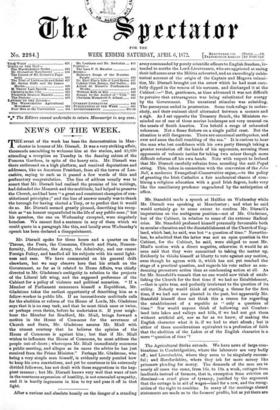Mr. Disraeli spoke for three hours and a quarter on
the Throne, the Peers, the Commons, Church and State, Noncon- formity, Education, the Army, the Admiralty, and our recent Foreign Policy, and handled all his subjects with his usual light- ness and ease. We have commented on his general drift elsewhere, but we may observe here that his attack on the Government, so far as it related to Home Affairs, was chiefly directed to Mr. Gladstone's ambiguity in relation to the projects of the Liberal left wing, and the supposed preference of the Cabinet for a policy of violence and political sensation. "If a Member of Parliament announces himself a Republican, Mr. Crladstone takes the earliest opportunity of describing him as a fellow-worker in public life. If an inconsiderate multitude calla for the abolition or reform of the House of Lords, Mr. Gladstone says that it is no easy task, and that he must think once or twice, or perhaps even thrice, before he undertakes it. If your neigh- bour the Member for Bradford, Mr. Mall, brings forward a motion in the House of Commons for the severance of Church and State, Mr. Gladstone assures Mr. Miall with the utmost courtesy that he believes the opinion of the House of Commons is against him ; but that if Mr. Miall wishes to influence the House of Commons, he must address the people out-of-doors ; whereupon Mr. Miall immediately summons a public meeting, and alleges as its cause the advice he has just received from the Prime Minister." Perhaps Mr. Gladstone, who being a very simple man himself, is evidently sorely puzzled how to keep his own convictions, and yet be courteous to his extremely divided followers, has not dealt with these suggestions in the hap- piest manner ; but Mr. Disraeli knows very well that want of tact in the courteous expression of hostility, is not concealed sympathy, and it is hardly ingenuous in him to try and pass it off in that Light.


































